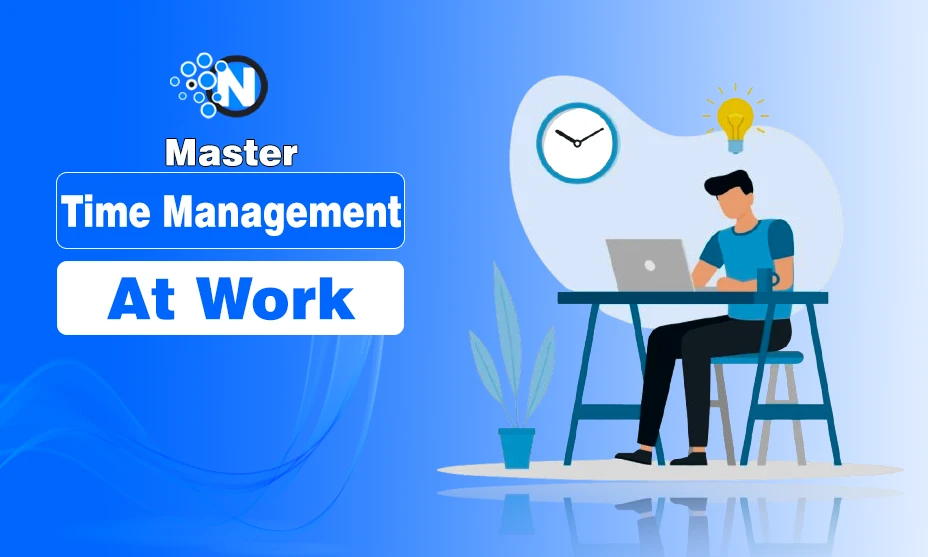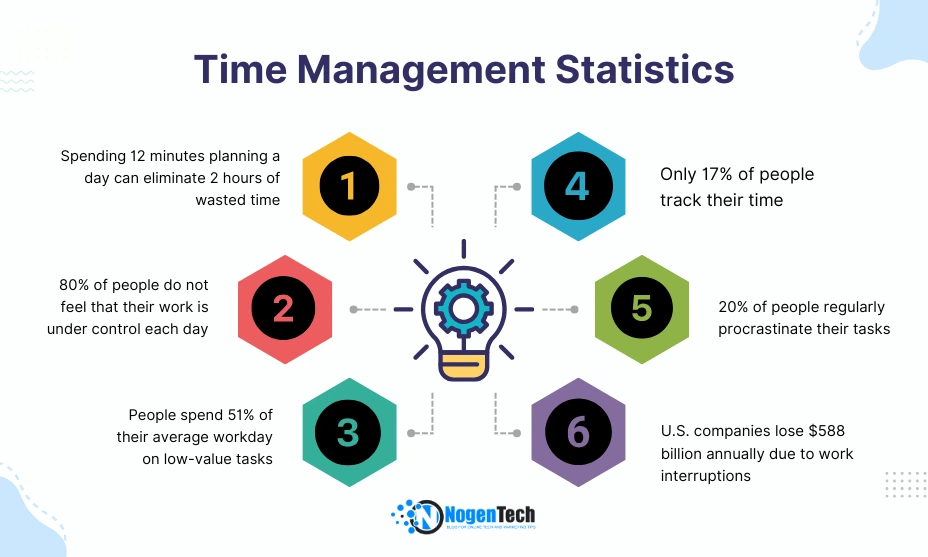6 Ways To Master Time Management At Work

Getting caught up in traffic and arriving late at work is common. By the time you’re in the office, you may have already missed an important meeting.
Then, you’ll have to struggle to complete your daily tasks. Unfortunately, you soon realize it’s already evening and you’ve not done much.
While some factors may be beyond your control, there’s something you can do to avoid wasting your precious days just like that: getting better at time management. Getting this right ensures you complete your planned activities in good time.
In this article, you’ll learn six practical ways to master time management at the workplace to get more done every day!
Top Time Management Statistics You Should Know
Here are some important workplace time management statistics you should know to understand the importance of time management:
- Spending 12 minutes planning a day can eliminate 2 hours of wasted time
- 80% of people do not feel that their work is under control each day
- People spend 51% of their average workday on low-value tasks
- Only 17% of people track their time
- 20% of people regularly procrastinate their tasks
- U.S. companies lose $588 billion annually due to work interruptions

Tips to Master Time Management At Work
1 Learn Time Management
You may not have covered a unit titled ‘time management’ in school. However, it’s critical to have an in-depth understanding of the primary concepts behind effective time optimization. So, consider enrolling in a time management course.
Effective time management requires a full understanding of concepts like prioritizing tasks, keeping a diary, how to be more productive and efficient, benefits of good time management, using time management tools, scheduling best practices, goal setting, and the art of concentration and focus.
The good thing is that you can sign up for time management courses online so you can get good at it whether you’re in the office or at home.

2 Set Attainable Goals
Setting your goals right will give you the urge to want to accomplish them. Above all, you have to make sure that they’re SMART goals. Being over-ambitious makes it more likely for you to fail to hit your target, and this might discourage you. You have to understand that being a bit lenient with yourself and setting realistic goals is more productive than setting idealistic but largely unattainable ones.
A good practice is to write your goals on paper and stick them on your office desk or the wall adjacent to you. This makes it easier to take a quick look at them and figure out what’s required of you any time during the day. This also helps you a lot in improving workplace communication.
3 Prioritize
Arrange your tasks according to their level of significance and urgency. For example, if you have pressing work to submit, make sure you do it first. Later on, you can look into the non-urgent tasks.
If possible, you could also delegate some work to other colleagues. Cramming dozens of tasks on a particular day would only leave you overwhelmed, which could reduce your productivity.
4 Avoid Multitasking
Doing multiple jobs at the same time may not be realistic. Even if you have three tasks with urgent deadlines, you shouldn’t try to handle them simultaneously. You’ll only reduce your pace in each task, making you less likely to get anything done for the day.
It’s good to focus on one task at a time. It’s such undivided attention that leads to faster completion of tasks. Once you’re done with the first one, move on to the next one and accord it your full concentration.
5 Limit Possible Distractions
There are many ways you could get distracted from your work. One of the primary culprits is your phone. It’s always tempting to read every message that comes through or logging into your various social media platforms. You may not realize it yet, but this can cost you a lot of hours every day, which you could’ve spent completing important tasks. Later in the evening, you can catch up with friends and go through the latest social news.
To avoid distractions, turn off all notifications for non-work-related apps. Also, control yourself and actively try to avoid picking up your phone and scrolling from app to app every other minute. You may also want to have only one window open on your computer. This way, you’ll only focus on the current tasks, enabling you to complete them as soon as possible.
6 Set Time Limits For Your Work
Another way to manage time properly is to have guidelines on how much time you intend to spend on each task. This way, you’ll know whether you’re falling behind your schedule or keeping up with it. Embarking on tasks without a set time limit isn’t ideal, as you may end up spending a lot more hours on them than is necessary.
On this same note, allocate time slots within your day for critical tasks, such as replying to emails at specific times. Maybe you can schedule this for eight to ten in the morning. It will give you ample time to attend to other work, rather than spending a whole day replying to emails.
Final Words
Excellent time management skills are critical to ensuring you complete all assigned tasks in good time. Not only will you be more productive, but also get your tasks done on time so that you’ll end up with even more free time to do other things.
Sure, it takes some effort to be efficient, but with the tips mentioned above, you’ll see a significant improvement in your productivity.




